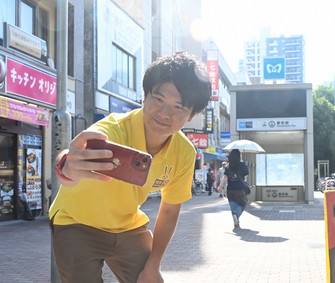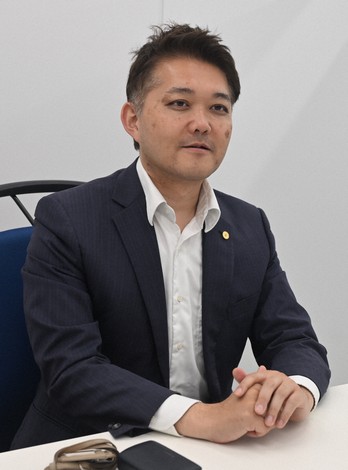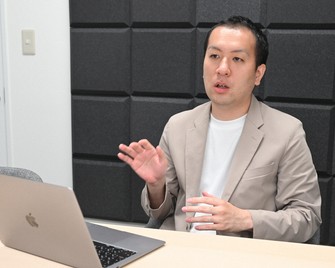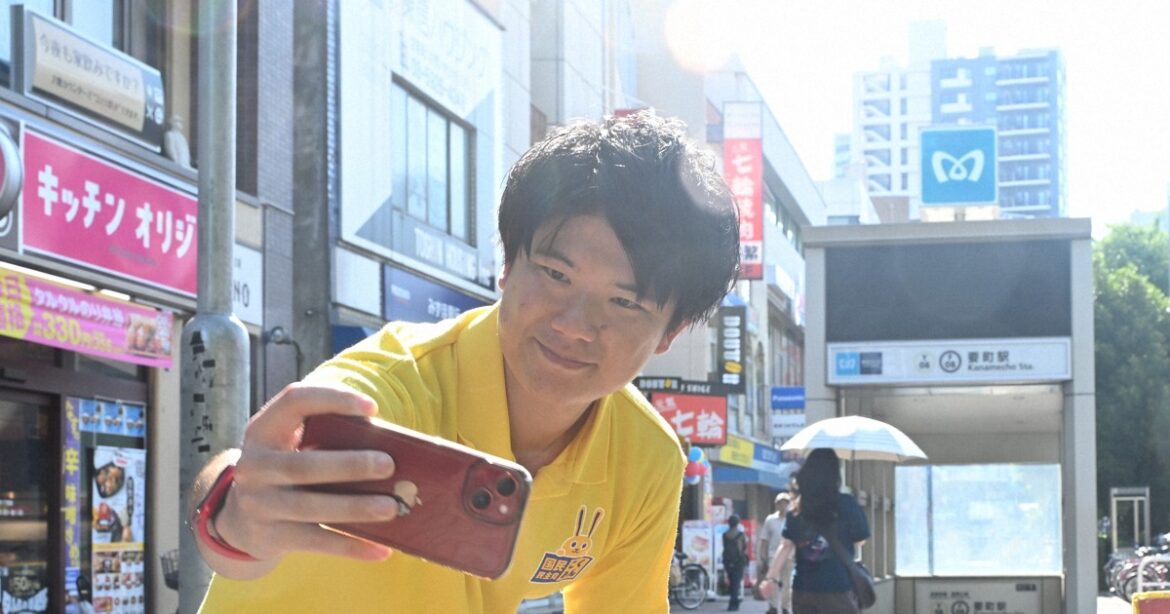
Takaki Harada, a member of Tokyo’s Toshima Ward Assembly, takes selfies to post on social media, June 27, 2025. (Mainichi/Yuga Matsumoto)
TOKYO — Social media strategies have come to play an indispensable role in elections in Japan, with some pointing out that disregard for social media can cost candidates votes. At the same time, there remain pitfalls with potential legal violations and unscrupulous consultants.
One morning in late June, Takaki Harada, a 34-year-old member of Tokyo’s Toshima Ward Assembly, was seen taking selfies with his smartphone in front of Tokyo Metro’s Kanamecho Station while checking the direction of the sunlight. He took many photos, adjusting the composition and angle of his face as he prepared to post information on social media about his street activities.
Though the selfies appear casual at first glance, Harada pays attention to many key points. He takes photos in the morning’s soft sunlight to make his face look better and includes the station’s sign in the background to convey the atmosphere of the area and create a sense of familiarity. These are techniques taught by an election consultant.
Not using social media will cost votes
Harada was elected with an endorsement from the Democratic Party for the People during unified local elections in April 2023. Despite being an almost unknown newcomer, he secured 3,550 votes, ranking second out of 56 candidates in his district.

Takaki Harada, a member of Tokyo’s Toshima Ward Assembly, posts his political activities on social media, June 26, 2025. (Mainichi/Yuga Matsumoto)
He attributed his success to standing in front of stations early every morning and engaging in conversations with voters while distributing flyers.
When it comes to local elections, he feels that the internet does not carry that much weight. Nevertheless, he frequently updates multiple social media platforms by himself. “Today’s voters first check online to see what kind of person the candidate is. If their social media posts aren’t updated, it can cost votes,” he said.
Social media is no merely longer a tool to boosts votes; it seems to have become an essential element that can result in lost votes if not utilized.
Social media’s influence continues to grow 12 years since ban lifted
Initially, Harada had little knowledge about managing social media. Then he turned to Daisaku Togawa, a 44-year-old administrative scrivener and election consultant.

Daisaku Togawa, an administrative scrivener and election consultant, is seen in Tokyo’s Shinjuku Ward, June 13, 2025. (Mainichi/Yuga Matsumoto)
Togawa has supported candidates in various elections, leveraging his legal knowledge. Harada received advice on a wide range of topics, from photo techniques for posts to complex legal systems. “When you’re new to elections, having someone to consult with is reassuring. Just avoiding legal violations was a relief,” he recalled.
A revision to the Public Offices Election Act allowed election campaigning using the internet starting in the 2013 House of Councillors race. It became possible to advocate policies through social media and blogs during the campaigning period.
It has been 12 years since then, and the influence of social media on elections continues to grow. When watching politicians on video-sharing sites, related videos appear one after another.
According to Kunikazu Suzuki, 36, editor-in-chief of the election information site “Senkyo Dot Com” (https://go2senkyo.com/), as many as 30% of voters rely on online information the most when casting ballots.
“In major elections, it is strategically unthinkable to disregard this 30%. Understanding the algorithms of social media is essential for modern elections,” Suzuki explained.

Kunikazu Suzuki, editor-in-chief of the election information site “Senkyo Dot Com,” is seen in Tokyo’s Shibuya Ward, June 18, 2025. (Mainichi/Yuga Matsumoto)
Traditionally, it has been said in Japan that three elements are necessary for election campaigns: local support, funds and name recognition. However, Suzuki believes that local support is shifting to “an online stronghold.”
He added, “By communicating on social media, candidates build a strong online support base, who then act as third parties to disseminate information about the candidates. Creating such a structure is indispensable in today’s election campaigns.”
Election trouble and unscrupulous operators
While online election activities are becoming more active, trouble is also occurring.
In the 2024 Hyogo gubernatorial election, a PR company president was referred to prosecutors on suspicion of receiving compensation for campaigning for candidate Motohiko Saito, who won the contest. The president allegedly supported Saito and was involved in setting up an official support account on social media.
While the number of election planners and consultants is increasing, Togawa pointed out, “There are many operators who provide incorrect information.” In some cases, they demand exorbitant fees of several million yen (tens of thousands of dollars) per month.
In Togawa’s case, the consulting fee is no more than about 400,000 yen (around $2,800) per month. “If you’re receiving compensation, you need to be well-versed in the complex Public Offices Election Act. Candidates are very concerned about whether an activity is illegal or not, so requests for legal checks by experts are increasing,” he said.
If the election campaign on social media is mainly planned and proposed by businesses, there is a risk that paying compensation could be considered bribery. However, the boundaries are unclear.
Suzuki noted, “At present, the risk of violating the Public Offices Election Act is too high. The complex and mysterious election law needs to be organized to reflect the current situation.”
(Japanese original by Yuga Matsumoto, Tokyo City News Department)


AloJapan.com